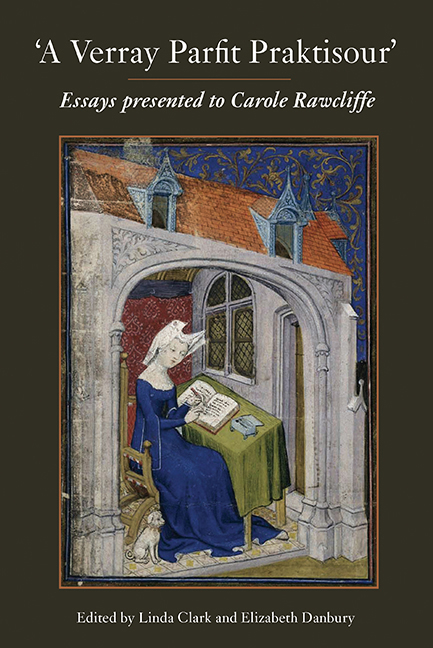Book contents
- Frontmatter
- Contents
- List of Illustrations
- List of Contributors
- Acknowledgements
- Abbreviations
- Tributes
- 1 Coslania, Norwich: an Archaeological Contribution to Early Medieval Urban History
- 2 A Queen in Rebel London, 1215–17
- 3 Defensive Officials and Defensive Levies in Fourteenth-Century Muster Rolls: an East Anglian Perspective
- 4 Lettice Oo? Queen Isabella's Accidental Apothecary
- 5 The First Instrument of Medicine: Diet and Regimens of Health in Late Medieval England
- 6 Politics and Piety: Norwich City Churches, Commemoration and Networking for the Afterlife
- 7 Telling the Time in Chaucer's London
- 8 The Bankrupt Bibliophile, William Paston, 2nd Earl of Yarmouth (1654–1732)
- 9 Ottomans, Neo-Ottomans and Invented Tradition in Hospital Music Therapy
- The Published Works of Carole Rawcliffe, 1976–2016
- Index
- Tabula Gratulatoria
8 - The Bankrupt Bibliophile, William Paston, 2nd Earl of Yarmouth (1654–1732)
Published online by Cambridge University Press: 09 May 2017
- Frontmatter
- Contents
- List of Illustrations
- List of Contributors
- Acknowledgements
- Abbreviations
- Tributes
- 1 Coslania, Norwich: an Archaeological Contribution to Early Medieval Urban History
- 2 A Queen in Rebel London, 1215–17
- 3 Defensive Officials and Defensive Levies in Fourteenth-Century Muster Rolls: an East Anglian Perspective
- 4 Lettice Oo? Queen Isabella's Accidental Apothecary
- 5 The First Instrument of Medicine: Diet and Regimens of Health in Late Medieval England
- 6 Politics and Piety: Norwich City Churches, Commemoration and Networking for the Afterlife
- 7 Telling the Time in Chaucer's London
- 8 The Bankrupt Bibliophile, William Paston, 2nd Earl of Yarmouth (1654–1732)
- 9 Ottomans, Neo-Ottomans and Invented Tradition in Hospital Music Therapy
- The Published Works of Carole Rawcliffe, 1976–2016
- Index
- Tabula Gratulatoria
Summary
In 1708 Humphrey Prideaux, dean of Norwich, wrote:
The Earle of Yarmouth is as low as you can imagin; he hath vast debts, and suffers every thing to run to extremity; soe his goods have been all seised in execution and his lands extended, soe that he hath scarce a servant to attend him or an horse to ride abroad upon, and yett cannot be perswaded to take any method of putteing his affairs into a better posture, wch they are still capable of, if he would set about it.
Such a statement immediately raises the questions: how had the earl descended to this condition; how far was it his fault; and, since he lived for another twenty-four years, what did he do with the rest of his life?
The career of the 2nd earl of Yarmouth has been seen as a brief inglorious epilogue to the history of the Paston family. Only the barest outline of his financial debacle has been known, as virtually none of his own papers have survived. Since, however, his career is documented in official archives and private letters, and the sale catalogue of his library reveals much about his intellectual life and interests, there is enough information for a reappraisal of this shadowy figure to be attempted. Unlike Yarmouth himself, his family is one of the best documented in English history. Their fifteenth-century correspondence, known simply as the ‘Paston Letters’, documents the rise of the family from modest beginnings. They proceeded to acquire land, to enter the service of the crown and to make advantageous marriages, becoming by the early seventeenth century the richest gentry family in Norfolk, with estates stretching across Norfolk and into Suffolk.
The family seat was originally at Paston Hall, on the north-east coast of Norfolk, but in 1598 Clement Paston, one of the gentleman pensioners, died without heirs and left his share of the family estate at Oxnead to his nephew, together with a large modern house built some twenty-five years previously on a south-facing site overlooking the river Bure; though built with the traditional great hall, screens passage and buttery, it also contained extensive private apartments.
- Type
- Chapter
- Information
- A Verray Parfit PraktisourEssays presented to Carole Rawcliffe, pp. 153 - 174Publisher: Boydell & BrewerPrint publication year: 2017



